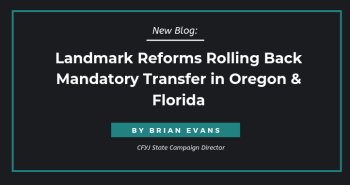Landmark Reforms Rolling Back Mandatory Transfer in Oregon & Florida

By Brian Evans, CFYJ State Campaigns Director
Back in 1994, the year the infamous federal Crime Bill passed – accelerating mass incarceration throughout the United States – the voting public in Oregon chose to endorse Measure 11, a “tough-on-crime” proposal that required children as young as 15 to automatically be transferred to the adult criminal justice system for a wide variety of crimes. By 1997, the legislature had expanded the list of crimes to 23 and lengthened the mandatory sentences associated with them.
Over the next quarter century, as states slowly came to realize the impracticality and immorality of mass incarceration policies, Oregon remained stuck with Measure 11, which could only be overturned by another public referendum or by a two-thirds vote in the state legislature.
That Measure 11 was a policy failure became clear. In Misguided Measures, a 2011 study co-authored by the Oregon Partnership for Safety and Justice and the Campaign for Youth Justice, the authors found that “counties that convict more young people under Measure 11 do not see better public safety outcomes”, and that “counties that have sent more youth to secure custody as a result of Measure 11 haven’t seen less crime.” The study also highlighted that “[m]ost youth charged with a Measure 11 offense are convicted of a non-Measure 11 crime.” And the study revealed that: “In Oregon, youth of color comprise 25% of the youth population but 36% of the youth indicted under Measure 11.” ,According to data collected between 1995 and 2012, Black youth were 8.6 times more likely than the general population to end up with a Measure 11 indictment.
Efforts to protect children from the harsh effects of Measure 11 were enacted – first to protect youth tried as adults pre-trial and then to protect youth convicted and sentenced as adults, but Oregon children continued to be transferred to the adult system and experience its traumatic harms.
But now, after years of tireless work by state advocates, including the ACLU Oregon, the Oregon Justice Resource Center, and the Oregon Criminal Defense Lawyers Association, and conservative groups including Right on Crime, Oregon has finally mustered the political will to dispense with Measure 11. By overwhelming majorities both the state House and Senate have voted for SB 1008, legislation that will effectively end Measure 11 by requiring a judge to hear all cases of potential transfer. Going beyond that, SB 1008 also ends juvenile life without the possibility of parole sentences, and allows a “second look” for children with long sentences.
It is a landmark success in youth justice reform, and another strong indication that states want to keep moving away from the mistakes of the 1990s.
Another indicator of that is in a very different state, Florida, where legislation to end the mandatory direct file of children to the adult system passed successfully this session as part of Florida’s First Step Act. Florida transfers more children than any state each year, so this was a major step forward for the state. In FY 2015-2016, mandatory direct file was 30.8% of direct files to adult court in the state; a ten percent increase over previous years. This is a major accomplishment, as advocates in Florida have fought for nearly five years to get reforms through both chambers of their state legislature.
Florida prosecutors will still have the ability to use discretionary direct file to send youth into the adult system without the independent review of a judge, so Oregon’s change certainly goes farther than Florida’s, but the trend towards sending fewer children to the adult system and treating more children as children remains clear.

